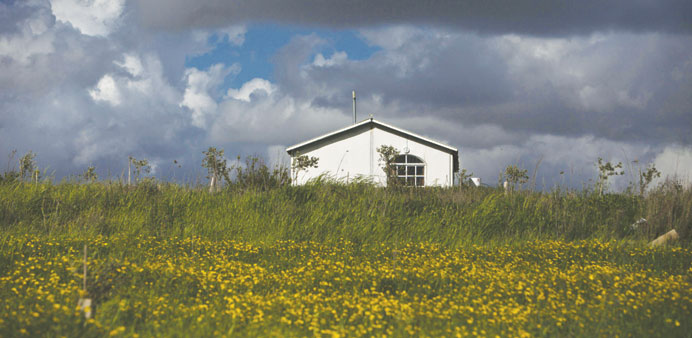A house is seen at the unauthorised Jewish settler outpost of Havat Gilad, in the West Bank city of Nablus.
Reuters/Jerusalem
Israeli Prime Minister Benjamin Netanyahu’s new governing coalition prepared to take office after a parliamentary vote yesterday with powerful roles reserved for supporters of settlers in occupied territory.
While the new line-up includes more moderates than in the outgoing government, the predominance of legislators who are either settlers or among their staunchest supporters could hamper any efforts to revive peace talks with Palestinians.
New Defence Minister Moshe Yaalon, a member of Netanyahu’s Likud party, opposes any curbs on settlement-building that Palestinians say must stop before they can return to the US-sponsored negotiations, which collapsed over the issue in 2010.
Israeli construction in the occupied West Bank, territory which the Palestinians want along with East Jerusalem and the Gaza Strip for an independent state, must be signed off by the Defence Ministry.
Yaalon’s predecessor, Ehud Barak, who headed a centre-left party but did not run in the January 22 election, was often accused by settlers of impeding settlement projects.
“When Barak headed the ministry, he occasionally blocked the momentum of settlement. The incoming defence minister, Moshe Yaalon, has sworn allegiance to Judea and Samaria,” Nahum Barnea, a political commentator for the Yedioth Ahronoth daily, wrote, using the Biblical names for the West Bank.
“In his honest, uncompromising way, he will move mountains for them (settlers),” Barnea said.
Palestinians say that Israeli settlements, considered illegal by most countries, pose an obstacle to peace and will deny them a viable, contiguous state.
The issue is likely to figure prominently in talks this week in Jerusalem between Netanyahu and Barack Obama, who will be visiting Israel and the West Bank for the first time since first elected US president in 2008.
After weeks of coalition negotiations, Netanyahu signed pacts with the centrist Yesh Atid and far-right Jewish Home parties last week, clinching a parliamentary majority.
The Knesset will ratify the new government, the first in a decade to exclude ultra-Orthodox Jewish factions that are at odds with Yesh Atid and Jewish Home over reducing state benefits for religious families and institutions and limiting military draft deferments for seminary students.
Yair Lapid, a former TV news anchor whose Yesh Atid party came in a surprise second to the prime minister’s right-wing Likud-Beitenu list in the election, has called for a resumption of peace talks with the Palestinians.
Danny Danon, Yaalon’s deputy and a Likud member, said on Israel Radio the administration was prepared to negotiate, but “there are many in this government who believe there is no one on the other side who truly wants to promote peace”.
Netanyahu’s new housing and construction minister, Uri Ariel, is a settler himself and member of Jewish Home.
He told Israeli television the new cabinet would continue to expand settlements “more or less as it has done previously”.
Several months ago, Israel announced plans to build more than 11,000 new houses in the West Bank and East Jerusalem, almost double the 6,800 it has erected since March 2009 when Netanyahu took office, the anti-settlement Peace Now group said.
In parliament, a settler leader will also serve as head of the finance committee, a particularly powerful body that can greatly influence Israel’s budget.
Some 500,000 settlers and about 2.5mn Palestinians live in the West Bank and East Jerusalem, which Israel captured along with the Gaza Strip in the 1967 Middle East war.
Key ministries
Prime Minister: Benjamin Netanyahu (Likud)
(also temporarily in charge of foreign affairs)
Defence: Moshe Yaalon (Likud)
Foreign Affairs: Benjamin Netanyahu (Likud)
Finance: Yair Lapid (Yesh Atid)
Interior: Gideon Saar (Likud)
Education: Shai Piron (Yesh Atid)
International Relations: Yuval Steinitz (Likud)
(also in charges of strategic affairs and intelligence)
Justice: Tzipi Livni (HaTnuah)
Agriculture: Yair Shamir (Yisrael Beitenu)
Internal Security: Yitzhak Aharonovitch (Yisrael Beitenu)
Economics and Trade; religion: Naftali Bennett (Jewish Home)
Housing: Uri Ariel (Jewish Home)
Transport: Yisrael Katz (Likud)
Energy and Water: Silvan Shalom (Likud) (also in charge of regional development)
Communications; Homefront Defence: Gilad Erdan (Likud)

